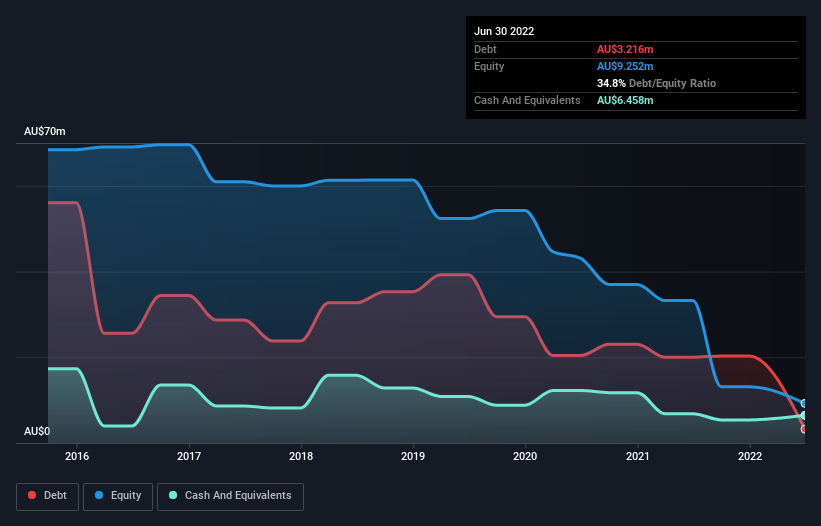Is Hills (ASX:HIL) Using Debt Sensibly?
The external fund manager backed by Berkshire Hathaway's Charlie Munger, Li Lu, makes no bones about it when he says 'The biggest investment risk is not the volatility of prices, but whether you will suffer a permanent loss of capital.' It's only natural to consider a company's balance sheet when you examine how risky it is, since debt is often involved when a business collapses. We note that Hills Limited (ASX:HIL) does have debt on its balance sheet. But should shareholders be worried about its use of debt?
When Is Debt Dangerous?
Debt and other liabilities become risky for a business when it cannot easily fulfill those obligations, either with free cash flow or by raising capital at an attractive price. If things get really bad, the lenders can take control of the business. However, a more usual (but still expensive) situation is where a company must dilute shareholders at a cheap share price simply to get debt under control. Having said that, the most common situation is where a company manages its debt reasonably well - and to its own advantage. When we think about a company's use of debt, we first look at cash and debt together.
See our latest analysis for Hills
How Much Debt Does Hills Carry?
As you can see below, Hills had AU$3.22m of debt at June 2022, down from AU$20.0m a year prior. But it also has AU$6.46m in cash to offset that, meaning it has AU$3.24m net cash.

A Look At Hills' Liabilities
Zooming in on the latest balance sheet data, we can see that Hills had liabilities of AU$21.6m due within 12 months and liabilities of AU$4.97m due beyond that. Offsetting this, it had AU$6.46m in cash and AU$13.5m in receivables that were due within 12 months. So its liabilities outweigh the sum of its cash and (near-term) receivables by AU$6.60m.
This deficit isn't so bad because Hills is worth AU$15.3m, and thus could probably raise enough capital to shore up its balance sheet, if the need arose. However, it is still worthwhile taking a close look at its ability to pay off debt. Despite its noteworthy liabilities, Hills boasts net cash, so it's fair to say it does not have a heavy debt load! The balance sheet is clearly the area to focus on when you are analysing debt. But you can't view debt in total isolation; since Hills will need earnings to service that debt. So if you're keen to discover more about its earnings, it might be worth checking out this graph of its long term earnings trend.
In the last year Hills had a loss before interest and tax, and actually shrunk its revenue by 74%, to AU$47m. To be frank that doesn't bode well.
So How Risky Is Hills?
We have no doubt that loss making companies are, in general, riskier than profitable ones. And the fact is that over the last twelve months Hills lost money at the earnings before interest and tax (EBIT) line. Indeed, in that time it burnt through AU$365k of cash and made a loss of AU$8.3m. But the saving grace is the AU$3.24m on the balance sheet. That kitty means the company can keep spending for growth for at least two years, at current rates. Summing up, we're a little skeptical of this one, as it seems fairly risky in the absence of free cashflow. The balance sheet is clearly the area to focus on when you are analysing debt. But ultimately, every company can contain risks that exist outside of the balance sheet. For example, we've discovered 2 warning signs for Hills (1 is a bit concerning!) that you should be aware of before investing here.
If, after all that, you're more interested in a fast growing company with a rock-solid balance sheet, then check out our list of net cash growth stocks without delay.
Valuation is complex, but we're here to simplify it.
Discover if Hills might be undervalued or overvalued with our detailed analysis, featuring fair value estimates, potential risks, dividends, insider trades, and its financial condition.
Access Free AnalysisHave feedback on this article? Concerned about the content? Get in touch with us directly. Alternatively, email editorial-team (at) simplywallst.com.
This article by Simply Wall St is general in nature. We provide commentary based on historical data and analyst forecasts only using an unbiased methodology and our articles are not intended to be financial advice. It does not constitute a recommendation to buy or sell any stock, and does not take account of your objectives, or your financial situation. We aim to bring you long-term focused analysis driven by fundamental data. Note that our analysis may not factor in the latest price-sensitive company announcements or qualitative material. Simply Wall St has no position in any stocks mentioned.
About ASX:HIL
Hills
Hills Limited supplies technology solutions to the healthcare, security, surveillance, and IT markets in Australia and New Zealand.
Slightly overvalued with worrying balance sheet.
Market Insights
Community Narratives



